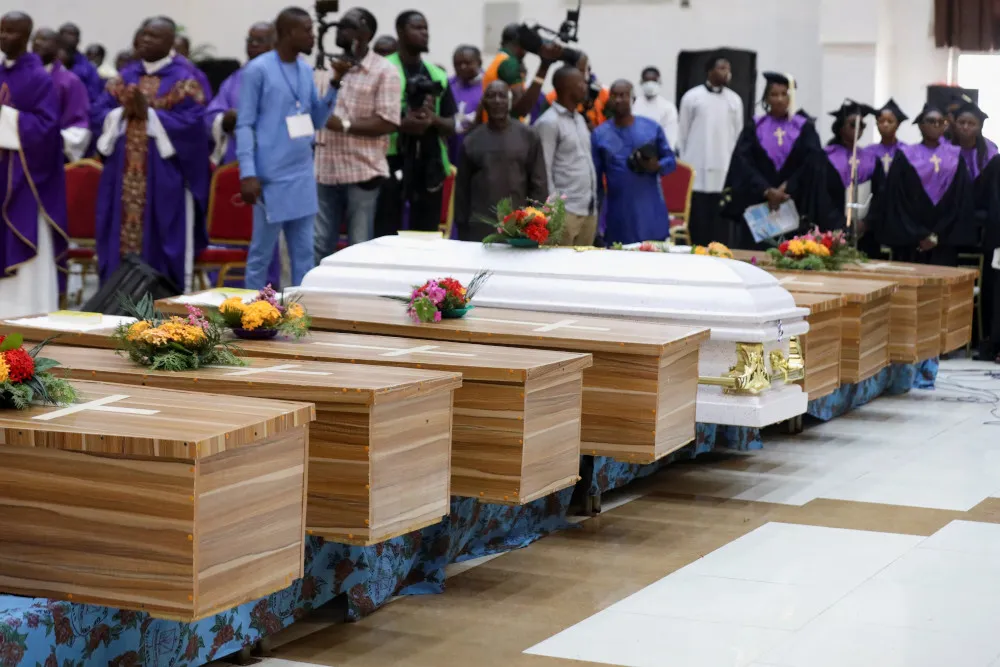
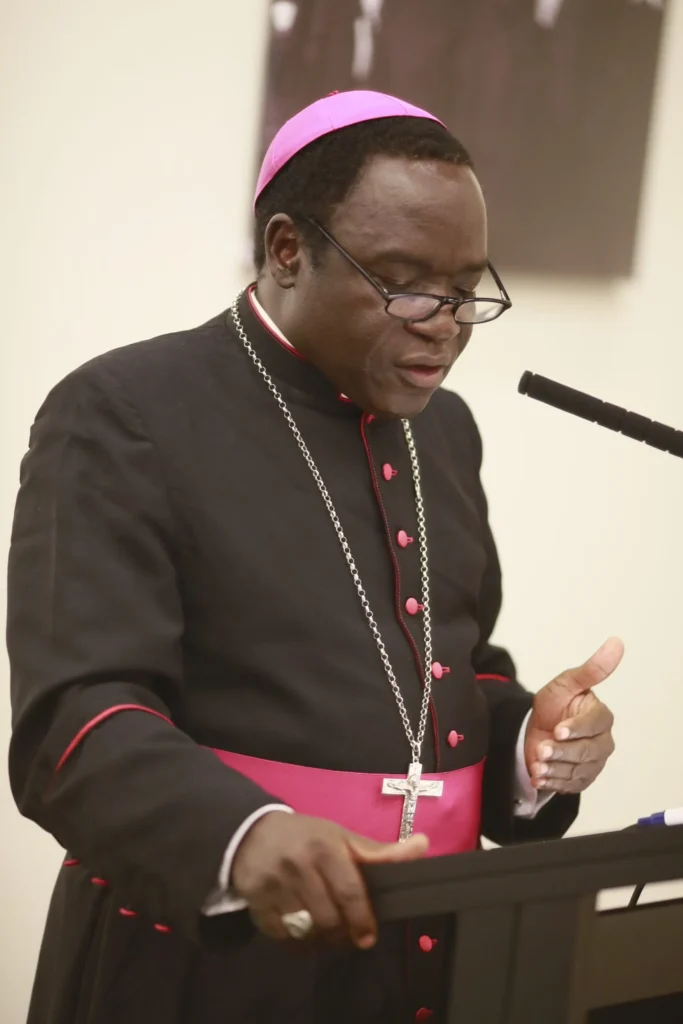
The Nigerian Christian community has been shaken by a recent address given in Rome by Bishop Matthew Hassan Kukah during the launch of Aid to the Church in Need’s 2025 Religious Freedom in the World Report. In his remarks, the Bishop of Sokoto acknowledged the widespread violence and insecurity ravaging Nigeria but questioned whether Christians in the country are being persecuted in the strict sense. While he condemned “murderous gangs of jihadists” who have “turned huge swathes of the Nigerian landscape into a killing field,” he also insisted that “we are not dealing with people going around wielding machetes and looking for me in order to kill me because I am a Christian.” Bishop Kukah cautioned against re-designating Nigeria as a “Country of Concern,” arguing that such a move would “hurt the initiatives we are working on with the current government to collectively resolve the nagging problems of…the persecution of Christians.” He went on to praise the administration of President Bola Ahmed Tinubu for “confidence-building measures” that, he said, show “a government willing to listen.”
Only months earlier, another Nigerian prelate—Bishop Wilfred Anagbe of Makurdi—had testified before the American Congress that Christians in Nigeria were indeed victims of systemic and targeted persecution. For his testimony, he was reportedly harassed and investigated by agents of the Nigerian federal government. His passionate defense of the faith community’s suffering stood in sharp contrast to Bishop Kukah’s transmission of this same sentiment of the people’s suffering but in conciliatory and diplomatic language in Rome.
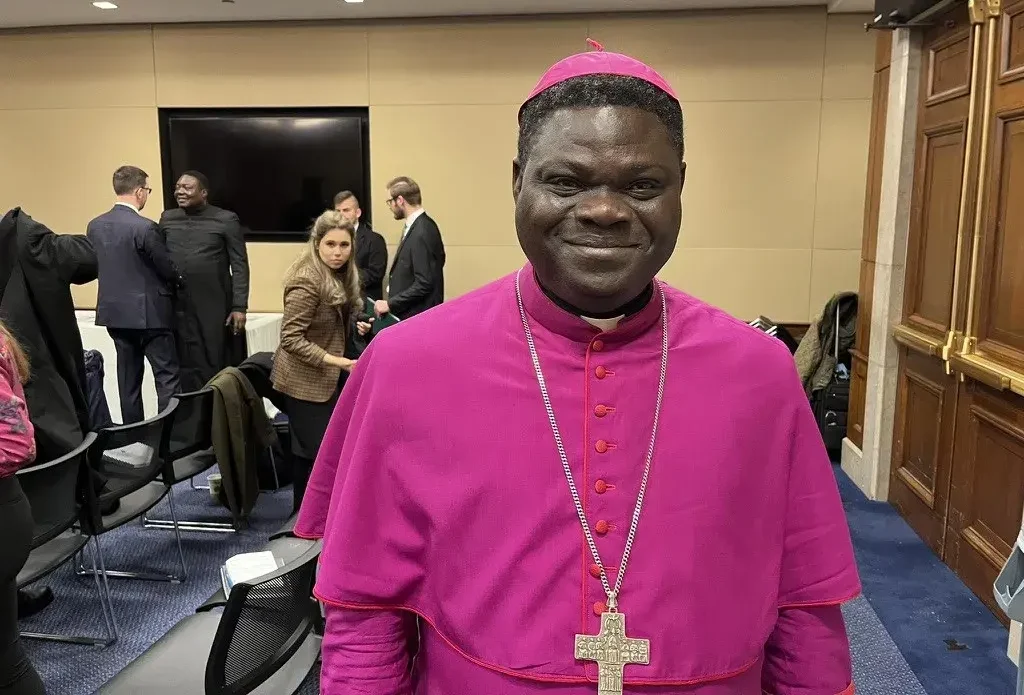
The two bishops’ differing perspectives—one prophetic and denunciatory, the other diplomatic and conciliatory—have laid bare the painful tension within the Nigerian Church over how to speak truth to power in a time of blood and national anxiety and anger. These perspectives represent two approaches to meeting the unacceptable situation in Nigeria: the need for prophetic lament, resistance, and protest against state and non-state actors who have waged a war of attrition against the Christian mission; and the pastoral, diplomatic approach that seeks to engage the government through conciliation and negotiation. This reveals a deeper question facing the Nigerian Church: how should shepherds speak when their flock bleeds?
Bishop Kukah has been a consistent champion for a robust engagement of the Church in Nigeria’s politics. However, it is hard to see the evangelical fruits of such engagement for the Christian community in Nigeria. Familiarity with power often leads to compromises that may bring temporary relief to Church leaders while potentially doing permanent harm to the Christian mission—even when that is not their intent. This is why the Church in its wisdom is cautious in its relationship with the state especially corrupt and extractive leaders who destroy the common good through what French social scientist and postcolonial commentator, Jean-François Bayart, calls the politics of the stomach (la politique du ventre).
Nigerian Church leaders, therefore, cannot give any impression in the eyes of the Nigerian Christians that they are appeasing the government of the day or have found favor with the state. The priorities and interests of the state and of politicians shift like the weather, driven by expediency, electoral gain, raw political power to dominate and preservation of their hold on Nigeria’s fast depleting oil wealth. The mission of the Church, however, possesses a deeper and more enduring rhythm—the stability of grace and the constancy of divine love and the mission of bringing about in small ways the fruits of the eschatological reign of God. To confuse these temporal orders or to align the eternal mission of the Church with the transient ambitions of political power through appeasement or comfortable relationship with Nigeria’s corrupt ruling class is to betray the very heart of the Gospel. C.S. Lewis once warned against this danger with prophetic clarity: “He who marries the spirit of the age will soon find himself a widower.” Though often paraphrased, this line distills a profound truth about the perennial temptation of religion to seek cultural or political approval. Lewis’s insight echoes the wisdom of Augustine, who distinguished between the City of God and the earthly city: the Church must dwell in the world but not be possessed by its powers.
However, the current debate goes beyond a single speech. It is a catalytic moment for the Nigerian Church. When Christians cry out for religious freedom and protection amid radical Islamic fundamentalism, silence becomes complicity, careless speech can inflame fragile peace, and disunity can prolong our long night. The path forward must be neither denial nor despair, but discernment—a rediscovery of the Church’s vocation to speak truth to power in love, to bear the wounds of the people without surrendering to anger or fear. As Pope Francis reminds us, fraternity is forged not in agreement but in shared suffering. The Nigerian Church stands today at such a threshold: called to lamentation as resistance, prophetic denunciation, and the bold proclamation of Gospel nonviolence tested in charity.
The pain of the Nigerian Christian community is deep; the sense of injustice is evident in the denial of Christian rights in many predominantly Muslim states that embraced Sharia and restrict Christians’ freedom of worship. The threats, fear, and anxiety are palpable, and religious freedom has never been so endangered. There is an architecture of structural violence and injustice that has destroyed social life, eroded the social compact, and turned ordinary existence into a cycle of fear and death. Christian communities have borne the brunt of this context created by leadership failures, corruption, and the collusion of political and religious elites.
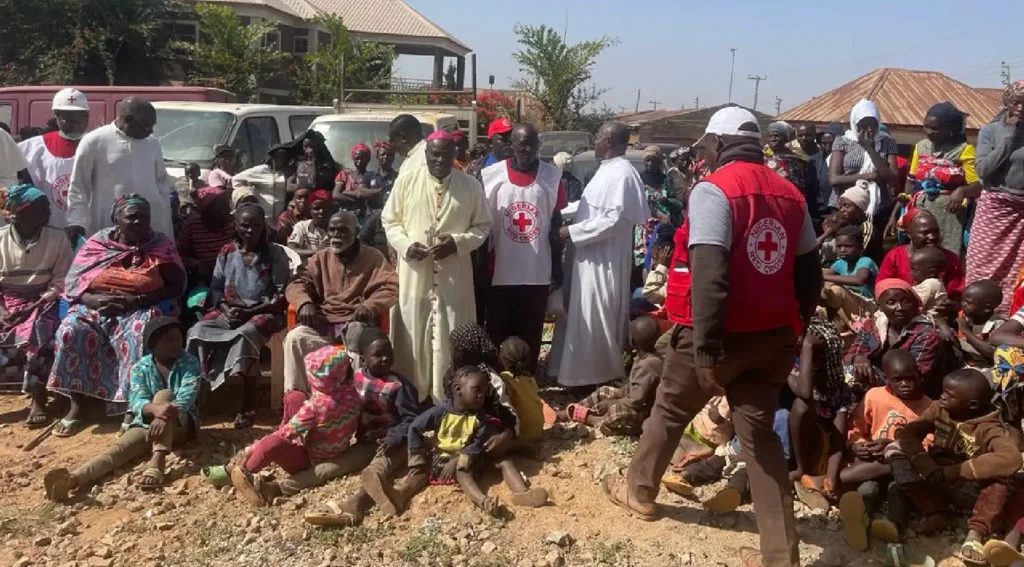
In the last decade alone, the Christian community has endured a scale of violence that shocks the conscience. More than 52,000 Christians have been murdered since 2009; over 18,500 churches and Christian institutions have been attacked or destroyed; and in 2025 alone, more than 7,000 Christians were killed—an average of 32 deaths every day . At least 1,200 churches are destroyed annually, and hundreds of priests, religious, and catechists have been kidnapped, tortured, or murdered. Many others live in camps for the internally displaced. In the Middle Belt, Christian villages have been emptied of their inhabitants, while in the North, believers are denied land to build churches, prevented from teaching Christian religious education in schools, subjected to blasphemy laws under Sharia, or excluded from public service. No one has been held to account, nor has the government—past or present—shown the courage to protect Christian lives or secure justice. Christianity is under attack in Nigeria. While some Muslim communities have also suffered, most assaults are directed at Christians and often perpetrated by groups invoking Islam as justification. Muslim leaders may condemn extremists as “not representing the true face of Islam,” yet few have stood in solidarity or crossed into our churches to weep with those who weep.
Christians and Muslims must negotiate coexistence in a peaceful Nigeria as long as Christian religious leaders refuse to be co-opted by the state into tranquilizing the just rage of the people. Yet the challenge before both faiths remains grave. Although Christians have experienced extraordinary numerical increase—rising from 176,000 in 1900 to around 95 million in 2020 (46.3%) according to the World Christian Encyclopedia (WCE) and projected to reach 197 million by 2060 (48%)—data for Muslims show near parity or slight advantage (46.2% now, projected 48.7% by 2050). Thus, while Christianity is expanding, it does not clearly outpace Islam, whose growth is driven by higher fertility rates in Muslim-majority states.
In Fratelli Tutti, Pope Francis calls the Church to build “a culture of encounter” where truth and compassion walk hand in hand. He warns that when truth is weaponized, it “becomes cold, distant, and unfeeling,” yet when compassion is detached from truth, it “degenerates into sentimentality or manipulation” (FT 184). This tension mirrors Nigeria’s own ecclesial moment. The unity of the Church lies not in one script but in one heart—Christ’s wounded heart. Pope Francis writes that “authentic social dialogue involves the ability to respect the other’s point of view and to admit that it may contain legitimate convictions or concerns” (FT 203). Bishop Anagbe’s cry from Makurdi and Bishop Kukah’s appeal from Rome are not contradictions but two voices of the same body—the cry of pain and the call for healing. The Church must hold them in a creative tension that leads to communion.
The tension between Christianity and Islam in Nigeria is not merely a contest of numbers but of witness. Both faiths are locked in a demographic and sociocultural rivalry as well as contestation for power that shapes the nation’s soul. The Christian community must interpret its expansion not as numerical triumph but as a call to service and solidarity in a society where faith, justice, and peace are deeply intertwined and where the Christian mission and message may well be the only balm for a wounded nation, and the only uncompromising voice that can stir the conscience of the nation, and steer the land away from this dangerous and darkening plain.
Pope Leo XIV’s Dilexi Te returns the Church to the wellspring of divine love: “I have loved you.” In this love, truth becomes an act of solidarity. The Holy Father insists that “truth without tenderness ceases to be evangelical; love without justice ceases to be divine.” Dilexi Te situates the preferential option for the poor as the crucible where both truth and unity are purified. For Nigeria, this means that the credibility of the Church depends not on alignment with power but on her willingness to suffer with the poor and persecuted. To love Nigeria truthfully is to name its wounds without fear and to bind them without resentment or facile diplomatic language which the wily and vile Nigerian politicians have learned to live with. The Nigerian bishops, though differing in tone, must rediscover the shared vocation of pastoral courage—a love that tells the truth even when it hurts, and a truth that heals even when it convicts.
In essence, Bishop Kukah’s speech sought to balance truth-telling with bridge-building. He acknowledged Christian suffering but placed it within a wider national tragedy affecting all Nigerians. Yet in doing so, he missed the deep anguish of believers living under the shadow of violence and fear. His words, intended as a pastoral appeal for dialogue and national harmony, have instead exposed the fractures within the Nigerian Church—between shepherds who prefer diplomacy with the powers that be and those who speak from the crucible of suffering of the poor of the land who inhabit the existential peripheries of life. This moment calls not for division among the Christian community of Nigeria but discernment—for a Church that listens to both its cautious diplomats and its wounded prophets, yet finds one united courageous voice of truth, love, common cause with the long-suffering Nigerian Christians, and solidarity for a nation bleeding at the heart. Augustine reminded us that the Church must dwell in the world but not be possessed by it. When pastors wed themselves to the spirit of the age, they reveal not the poor man of Galilee but our all-too-human thirst for power and relevance.
Given the corruption of the state and the government’s failure to protect lives and property, Christian bodies—the Catholic Bishops’ Conference of Nigeria (CBCN), the Christian Association of Nigeria (CAN), and the Pentecostal Federation of Nigeria (PFN)—should consider a moratorium on receiving donations from governments as a prophetic act of protest. Accepting favors and patronage from politicians in this current dispensation is a counter-witness to the Gospel. Hobnobbing, wining and dining with those responsible for the nation’s moral decay, the heart wrenching suffering of our people and the persecution of Christians borders on heresy and betrays the Gospel.
Church leaders must also collaborate with theologians, political analysts, canonists, and lawyers so that public statements emerge from prayerful reflection and sound analysis. Their witness must be prophetic, grounded in data, and born of the tears and faith of a wounded people who, like Mary, are standing strong at the foot of the Cross. From St Theresa’s Church, Madalla, to St Francis Church, Owo; from Yelwata’s killing fields to Kafin Koro’s quiet plains; from Good Shepherd Seminary, Kaduna, where Michael Nnadi of Sokoto diocese was murdered, to St Albert the Great Seminary, Fayit, and Immaculate Conception Minor Seminary, Auchi—the blood of Nigeria’s martyrs and the heart of the Christian future in Nigeria ( through the killing of young seminarians) cries to heaven.
Our Christians are dying every day, and the poor of the land are crying, yet we as religious leaders often ignore their pain, minimize their suffering, or treat their deaths as part of the price that the weak must pay for the future of the Church and nation—an illusion sustained by political and religious elites who benefit from the status quo. It is, however, a reflection of the colonial mentality that we are fighting each other over whether the United States should designate Nigeria as a country of concern for religious freedom or over what Aid to the Church in Need has documented about us. Nigeria indeed needs the help of the international community, and Pope Leo has added his voice to calls for the protection of and justice for Christians in a peaceful Nigeria, but the rot in Nigeria and the task of cleaning this mess, restoring trust, and building an inclusive state belongs to Nigerians both at home and abroad.
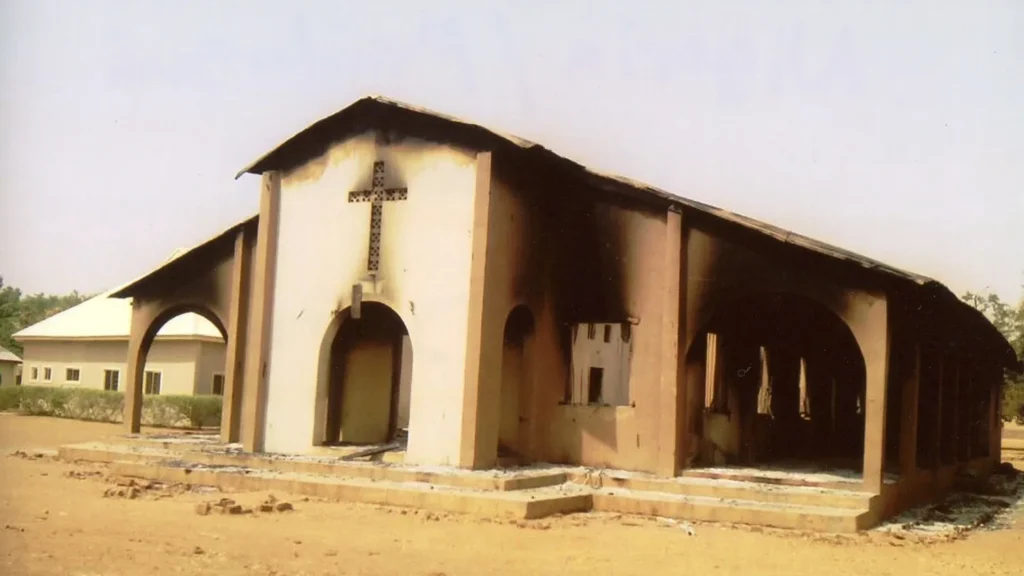
The mission of saving Nigeria and renewing the Christian witness must begin from within—from leaders who listen to the poor, walk among them, and, as Dilexi Te (61) proposes, learn from them as the Church’s best teachers and mediate their narratives in our utterances. We must allow their wounds and tears to awaken us from our dangerous closeness to the powerful of this world, lest we mediate the deceptive narratives of hope by politicians built on a machinery that has turned Nigeria into a valley of tears and ungovernable spaces. To ignore or minimize the suffering of our people is to betray them. Nigeria is already a nation of concern before God because God listens to the cries of the poor and is concerned about their tears. U.S politicians might use our tears to advance a white Christian nationalist agenda and label us for their own political gains, but our God is concerned about us and has made a preferential option for and with the poor of Nigeria and will bring down the mighty in Nigeria who oppress God’s people. If not now, then certainly later. The Church in Nigeria must make common cause with her poor and persecuted members in both the words, and actions of our Church leaders. Only by embracing the suffering of the people can the Church in Nigeria rediscover its prophetic soul and become a sign of hope and a means for God’s liberation of the poor in a land overshadowed by fear and dripping with sour grapes of injustice, mistrust, civic, and moral fatigue, and national ennui.
This is one of possible arguments on this topic. VoiceAfrique invites our readers, pastors, theologians, and public intellectuals to contribute to this urgent conversation: Are Nigerian Christians Persecuted? The debate around Bishop Matthew Hassan Kukah’s address in Rome and Bishop Wilfred Anagbe’s testimony before the U.S. Congress have reopened deep questions about faith, truth, and witness in a wounded nation. We welcome thoughtful essays, pastoral reflections, or commentaries (800–1200 words) that speak to the lived experience of the Church in Nigeria—its suffering, resilience, and prophetic voice. How should Christians interpret this moment? What does authentic witness look like amid fear, division, and hope?
Send contributions to coordinating.servant@pactpan.org Together, let us discern how the Nigerian Church can speak with one heart for a nation in pain.
—Stan Chu Ilo, Editor-in-Chief
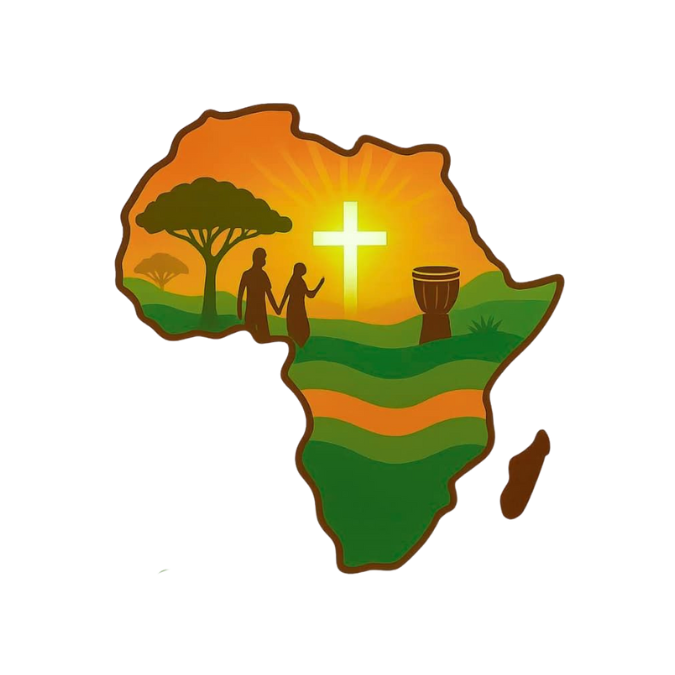



6 comments
Thanks, Fr Stan. I always love reading you because you always say it the way it is– without sugarcoating it.
Prof, you captured the heartbeats of the poor Christians in Nigeria. Most of those who try to put up a different narrative, arguing from the point of view that more Muslims have been killed in Nigeria, do not understand the single Fulani agenda. And this to islamize Nigeria through a jihad that will impose and perpetuate Fulani hegemony over the entire Nigerian State.
The killings in the Muslim dominated North is the fallout of an uprising from the conquered and subjugated Hausa tribe that embraced the Fulani Islamic religion, erroneously believed to a moral cleansing force against the corruption that invaded the Hausa community before the advent of the Fulani tribe, or so they were deceived into believing. Before they knew what was happening, they had been overrun through juhad. The degree of subjugation was such that today the Hausas occupy no positions of authority. They are treated as slaves in their own land. This is the basis of their revolts against the Fulani oligarchy and the resultant massacre of even their fellow Muslims. This accounts for the constant war in Katsina, some parts of Kaduna, Zamfara among others.
Down South, the same agenda is being is being prosecuted with the massacres in Benue, Kogi, South West and even in the Christian dominated South East and the South South. So the call to redesignate Nigeria as a Country of Particular Concern is not out of place. It is an urgent necessity to save Nigeria from the Fulani Islamic conquest.
The call for the US government to work with the Nigerian government is another way to bring about the Fulani Islamic agenda more quickly than expected. The Nigerian government and their political class are complicit by their financial sponsorship, aiding the massacre by first disarming the targeted communities to pave way for the jihadists, by the numerous air raid of soldiers who dare to attack the jihadists, by their wicked scheme of pardoning terrorists and integrating them into the Nigerian army as so called repented terrorists, by retiring and sanctioning officers who dare demonstrate patriotism in trying to pursue an antiterrorist campaign and in their complicit silence and indifference when all these are happening.
The US had been selling arms to the Nigerian government, why are the Boko Haram terrorists better equipped than the Nigerian army? It is alleged that those arms and ammunitions are diverted to the terrorists.
The Nigerian Muslim-Muslim government should not be trusted.
Fr. Professor Stan Chu Ilo no doubt wrote from his heart as a Theologian and a Scholar on crucial point of concern “persecution of Christians in Nigeria”. Ideally, the two bishops are right depending on where they are operating and who they were addressing. The issue at hand is: “What is the stance of the Catholic Bishops Conference of Nigeria.” Are our Bishops Theologians as well as Elders in the socioculural landscape of Nigeria. Contextual theology deals with real issues affecting people that add or prevents the growth of the Chistian faith. Truth told in charity demands more dialogue, most Bishops in Nigeria do not dialogue with Theologians, they rather teach them pastoral duties, and remind them that we are Shepherd, you belong our flock so keep quiet. My contribution to the ongoing burning issue is a call for a webinar, where all interested in this burning issue can be openly discussed and objective TRUTH espouse. Love explores all options to the task of propagating the Truth that is Trinitarian but contextual to the Nigerian Church.
Revd. Fr. Dr. Barnabas Sama’ila Shabayang,
Dean: Faculty of Theology, Veritas University Abuja, Nigeria
“In essence, Bishop Kukah’s speech sought to balance truth-telling with bridge-building. He acknowledged Christian suffering but placed it within a wider national tragedy affecting all Nigerians”
I woke up this morning to your insightful article on Kukah. Honestly, if there is anyone that has received so much from the brunt of terrorists, it is Bishop Kukah. His diocese and priests are being targeted because of his courage and criticism against this government. He has even paid ransoms. Last year when I visited him traveling from Abuja to Sokoto, the air hung with fear of Jihadists sacking the village and kidnapping one of his priests.
One of his priests working with us here in Niger had his village, with majority Christian sacked by bandits and his Mum kidnapped, his Mum wasn’t released until a ransom was paid.
Christian in his village continues to face attack, aided by some Muslims who wanted them displaced and sacked so they could have their land.
In essence some Muslim invited these bandits and made it a Muslim – Christian thing.
I don’t doubt Bishop Kukah’s courage but this time, he has fallen into the “elite trap” – ie he is more interested in defending the image of Nigeria and Tinubu’s administration than stating facts as it is.
Bishop Kukah is not a diplomate, or government agent. Regardless how close and near he is to this government, he is first a pastor and a priest. Standing as voice of conscience comes first rather than trying to protect the image of Nigeria.
Insecurity is not the only war targeted on Christian. The presence of Sharia in Northern Nigeria that runs parallel to the secular constitution in disregard to the feeling of Christian in the North is already an act of official terrorism. It has exposed christians to unfair court judgement and emboldened extra judicial killing by mobs like the case of Deborah.
Bishop Kukah’s speech will only encourage the complacency of this government to resolve religious driven terrorism and doesn’t encourage accountability.
It is unfortunate that in this instance, he stood as an ambassador of a Nigeria project that is interesting in protecting image instead of addressing issues.” – Stan
I woke up this morning to your insightful article on Bishop Matthew Kukah. Honestly, if there is anyone who has borne the full brunt of terrorism in Nigeria, it is Bishop Kukah himself. His diocese and priests have been relentless targets simply because of his courage and his fearless criticism of government failures.
He has paid ransoms, comforted bereaved families, and watched his flock suffer for speaking truth to power. When I visited him last year, traveling from Abuja to Sokoto, the air was thick with fear — fear of jihadists overrunning villages and kidnapping priests.
His Bishop Court was nearly burnt and his life endeangered by Islamists mob during the lynching of Deborah Samuel.
One of his priests, now working with us here in Niger, had his village — a predominantly Christian community — attacked and burned by bandits. His mother was kidnapped and released only after a ransom was paid. The Christians there continue to face attacks, often instigated by local Muslim collaborators who seek to displace them and seize their lands. In some cases, these bandits were invited, turning what began as banditry into an outright religious war.
So, I do not doubt Bishop Kukah’s courage. But this time, I fear he has fallen into what I call the “elite trap” — becoming more interested in defending Nigeria’s image and Tinubu’s administration than in stating the truth as it is.
Bishop Kukah is not a diplomat or a government envoy. Regardless of how close he may be to the corridors of power, he is, first and foremost, a pastor and a prophet — a moral voice and conscience of the nation. His first loyalty should be to truth and justice, not to political image management.
The persecution of Christians in Northern Nigeria goes beyond physical insecurity. The institutionalization of Sharia law alongside the secular constitution has created a dual system that marginalizes Christians and exposes them to judicial bias and mob violence — as we saw in the tragic case of Deborah Samuel. This parallel system is, in itself, a form of official terrorism.
Bishop Kukah’s recent remarks, unfortunately, risk emboldening government complacency and weakening the push for accountability in the face of religiously driven terror.
It is painful to say, but in this instance, Bishop Kukah stood not as a prophetic conscience, but as an ambassador of a Nigeria more interested in image laundering than truth. And that is a dangerous silence — one the suffering Church in Northern Nigeria cannot afford.
As I write this, the image of Bishop Kukah’s book, “A Witness to Truth” lying in my shelf, comes to mind. Together with the video of Bishop Kukah at the Oputa panel speaking truth to power, I wonder what happened to the man I have great cinfience and respect for this time around.
–
Very touching!
Fr. Stan, a trillion thumbs up for you!! Your response is apt, constructive, factual and bold! Truth must be the way the situation is, otherwise, we lose it! Nothing else does Jesus demand than the truth even when it will cost our lives. For weeks now we have been discussing about whether Christians are persecuted – genocide in Nigeria or not on NIREC (National Interreligious Council with Fr. Prof. Cornelius as the Secretary General of the body). What echs is that either some of us are trying to play it safe, to please the political class or too afraid to lose our lives. Has there been a time when Christians started Religious crisis in Nigeria? No! Has there been a time when Christians initiated the destruction of or destroyed a mosques? Not that I know of or have heared except on grounds of self-defense in extreme religious crises. I am from Southern Kaduna and was in Southern Kaduna in 1987, not far from Kafanchan, when Moslem Youth started attacking Christian Youth in Kafanchan while they were having a Christian Fellowship. This resulted in deaths. The Moslem Youth took scores of dead bodies to Kaduna and started chanting Allahkubar while also spreading false news that Moslems had been killed in Kafanchan. Within minutes, the crises spread far and wide all through Kaduna State and beyond to Katsina, Kano, etc. So many Christians were killed and over 250 Churches were burnt down. The Archive of the Archdiocese of Kaduna should have the details. I was in Bauchi in 1991 when the Moslems killed Christians. This started on Saturday evening through to Wednesday without government intervention. The then Governor, Abundant Ali did not give order to the Military to intervene because he order had not been given to him by President Ibrahim Babangida. It was Col. Umar Kaidangiwa, who was the Commandant of the Military that gave order to the military to intervene. Coincidentally, he was the Governor of Kaduna State in 1987 when the first religious bloody crises took place. I guess, Umar had learnt his lesson and could also see through the facts, he took the bold step at the detriment of his career to order the Army to intervene to safe the Christians who had taken refuge in the Army Barracks because the Moslems were matching to the Barracks to attack the Christians. What about the Zango Kataf bloody crisis of 1992 to 1993, initiated and started by the Moslems against the majority indigenous Christians! Zango Kataf is my local government. What about the 2000 Crisis in Kaduna! After the attack of St. Theresa, Madalla, what about the attack of St. Monica, Malali in Kaduna State and St. Finbar’s in Plateau State. These attacks were during Sunday Masses. What about attacks of other non- Catholic Churches. What about the ongoing killings of Priests and Pastors in Nigeria! Were the Chibok Girls not 99% Christians! What about Leah Sharibu, the only Christian girl held till today, on grounds of her faith and others – Moslem girls released. What about the bloodiest crises of 2001 in Jos that went on up to 5 days without government intervention – I was trapped in that crises so I am talking from experience. Who was the architect and the Mastermind?? The Moslems against the Christians. Since then, Plateau State has not known peace. Kaduna State and particularly the Southern part has been the epicenter of attacks of Christians, with Benue State, Niger State not left out This is currently ravaging in Bokkos, Plateau State and now Kogi and Kwara States, with Edo, precisely Auchi, not left out. If you take a survey of where these attacks are taking place, you will realise they are mostly in Christians dominated States and areas. One can go on and on. I rest my case here for now. God bless you.